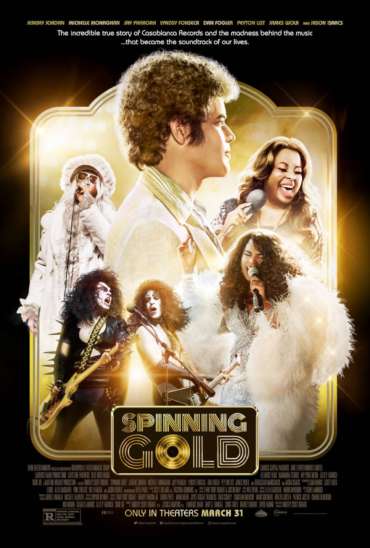Spinning Gold depicts the life and career of record producer and Casablanca Records founder Neil Bogart, who was credited with discovering many iconic musical acts such as Donna Summer, Kiss, Village People; and signing and pushing acts including Gladys Knight and the Pips, the Isley Brothers, and more to even greater heights. This tagline that “They Weren’t Just Making Music…They Were Making History” holds true as we travel through generations as artists and producers alike figure out their way toward achieving the literal impossible dream. With an interesting film style, this film promises a wild and unforgettable ride.
This film is a love letter from a son to his fallen patriarch. That notion was loving noticed at the end of the film with the end card that reads, “For you, Dad…” With a runtime of 137 minutes, it’s incredibly long and zigzags all over the place. Its tone bounces from seemingly heartfelt to comical on a flip of a dime. The number of musical artists who appear as the celebs and entertainers who were around during the years in question, the glorious 70s and 80s is almost wasteful. Chronicling his rise to fame, this film showcases Neil Bogart’s hand in the growth, maturation, and legacy of Casablanca Records.
Billed as “a story so unbelievable that it can only be true,” and “the motion picture event of the musical journey of Neil Bogart,” I was expecting something along the lines of Cadillac Records or even like a white ‘Ray,’ this was more like the ‘The Hangover’ or a ‘The Best Of…’ DVD. A series of vignettes strung together with an interesting soundtrack is what I felt by the time this film finally ended. Each scene seems intentional but overall, the story wasn’t as compelling as the truth it comes from.
With a cast of artists and entertainers such as Jeremy Jordan, Wiz Khalifa, Jason Derulo, Jay Pharoah, Ledisi, Chris Redd, Pink Sweats, and newcomer Tayla Parx as Donna Summer – I expected some sense of balance between the star power and the time frame of these events. However, the timeline was jumpy and not in a Multiverse of Madness kind of way. The hilarity of the gimmicks used to make the world hear the eclectic sound of Casablanca Records was not balanced well with the B storylines of free love, divorce, and finding a way forward. It was more comedy than intentional perseverance.
The imagery, the covers performed by modern artists, the counter illustrating how much money had been wasted in pursuit of the dream, the snarky comebacks and even the flashback to a lesson Neil’s father taught as a child were all threads that deserved full pulls. Sadly, most of the film’s direction feels stalled literally by the challenges production had with location and its eventual stars. Overall, the heart of how Neil made Casablanca Records’ eventual success real not only for himself and his team but also for his artists and the listening world abroad is a real story worth a vulnerable, listening audience.

